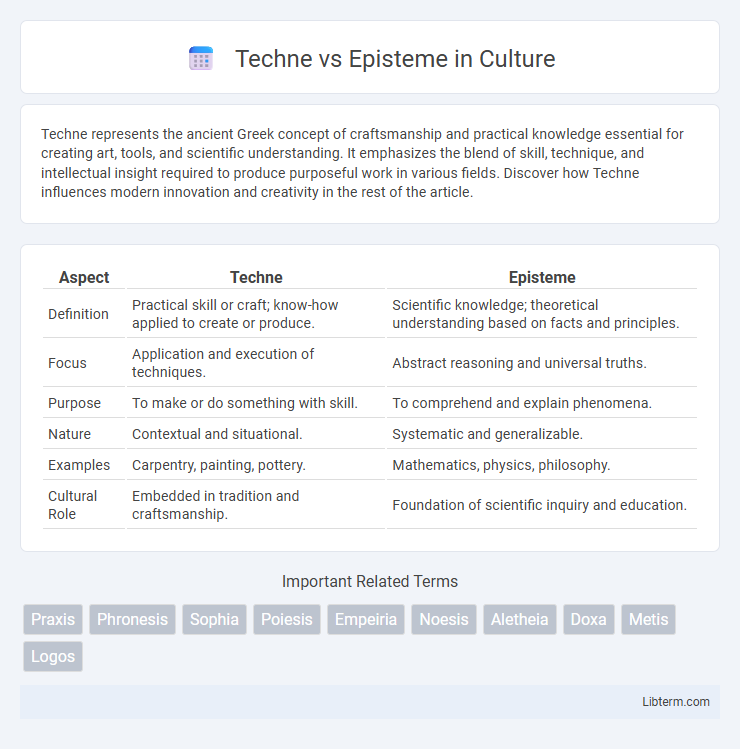Techne represents the ancient Greek concept of craftsmanship and practical knowledge essential for creating art, tools, and scientific understanding. It emphasizes the blend of skill, technique, and intellectual insight required to produce purposeful work in various fields. Discover how Techne influences modern innovation and creativity in the rest of the article.
Table of Comparison
| Aspect | Techne | Episteme |
|---|---|---|
| Definition | Practical skill or craft; know-how applied to create or produce. | Scientific knowledge; theoretical understanding based on facts and principles. |
| Focus | Application and execution of techniques. | Abstract reasoning and universal truths. |
| Purpose | To make or do something with skill. | To comprehend and explain phenomena. |
| Nature | Contextual and situational. | Systematic and generalizable. |
| Examples | Carpentry, painting, pottery. | Mathematics, physics, philosophy. |
| Cultural Role | Embedded in tradition and craftsmanship. | Foundation of scientific inquiry and education. |
Understanding Techne and Episteme: Defining the Terms
Techne refers to practical knowledge or craft, focusing on the skills and techniques required to create or perform specific tasks, often rooted in experience and application. Episteme denotes theoretical knowledge or scientific understanding, emphasizing universal truths and principles derived through reasoning and systematic study. Distinguishing techne and episteme clarifies the difference between applied competencies and foundational knowledge in philosophy and epistemology.
Historical Origins: Techne and Episteme in Ancient Philosophy
Techne and episteme trace their origins to ancient Greek philosophy, with techne referring to practical skills or crafts and episteme signifying theoretical knowledge or scientific understanding. Plato and Aristotle extensively examined these concepts, distinguishing techne as skill-based know-how essential to producing tangible results, whereas episteme represented systematic, universal truths derived through reasoned inquiry. This foundational distinction influenced the development of various disciplines, from art and engineering to science and metaphysics in Western thought.
Key Differences: Practical Skills vs Theoretical Knowledge
Techne emphasizes practical skills and craftsmanship, focusing on the ability to produce tangible results through hands-on experience and applied techniques. Episteme involves theoretical knowledge and understanding of universal truths, prioritizing abstract reasoning and scientific principles over direct application. The key difference lies in techne's goal of creating and doing, while episteme seeks to explain and comprehend fundamental concepts.
Significance of Techne in Modern Professions
Techne embodies practical skill and craftsmanship, essential in modern professions such as engineering, healthcare, and information technology, where applied knowledge ensures effective problem-solving and innovation. Its significance lies in the tangible execution of expertise, transforming theoretical insights into real-world applications that drive productivity and quality. Emphasizing techne enhances competency development and adaptability in rapidly evolving professional environments.
The Role of Episteme in Scientific Advancement
Episteme represents systematic, theoretical knowledge critical for scientific advancement, enabling the formulation of universally valid principles and laws. This foundational understanding supports the development of hypotheses, experimental design, and interpretation of empirical data, driving innovation and technological progress. By prioritizing epistemic rigor, researchers ensure reproducibility and objective validation, which are essential for cumulative scientific growth.
Interplay Between Techne and Episteme in Innovation
The interplay between techne and episteme drives innovation by combining practical skills with theoretical knowledge, enabling the development of novel solutions. Techne provides the hands-on expertise necessary for implementing ideas, while episteme offers a deep understanding of principles that guide meaningful advancements. Integrating these forms of knowledge fosters creativity and efficiency in scientific and technological progress.
Case Studies: Techne and Episteme Across Different Fields
Case studies illustrate how Techne, as practical knowledge and craftsmanship, drives innovation in fields like engineering and medicine through skillful application and experimentation. Episteme, representing theoretical understanding, underpins disciplines such as philosophy and science by providing foundational principles and systematic knowledge. The interplay between Techne's hands-on techniques and Episteme's conceptual insights fosters advancements and problem-solving across diverse professional domains.
Philosophical Debates: Which is More Essential?
Techne and episteme represent distinct knowledge forms in philosophical debates, with techne emphasizing practical skills and craftsmanship, while episteme focuses on theoretical understanding and scientific knowledge. Scholars argue that techne is essential for applying knowledge to real-world problems, demonstrating adaptability and innovation, whereas episteme provides foundational truths necessary for coherent and systematic inquiry. The tension lies in whether practical competence or theoretical insight holds primacy in the pursuit of wisdom and problem-solving effectiveness.
Techne, Episteme, and the Digital Age
Techne, rooted in craftsmanship and practical skill, emphasizes the application of knowledge to produce tangible outcomes, contrasting with Episteme's theoretical and abstract understanding. In the Digital Age, Techne manifests through coding, software development, and digital design, driving innovation by transforming theoretical data into functional technology. The synergy between Techne and Episteme propels advancements in artificial intelligence, cybersecurity, and digital infrastructure, highlighting the indispensable role of practical expertise alongside scientific knowledge.
Future Perspectives: Integrating Techne and Episteme for Holistic Learning
Integrating techne and episteme creates a comprehensive learning approach that combines practical skills with theoretical knowledge, enhancing problem-solving and innovation in various fields. Advances in educational technology and cognitive science support this integration by promoting experiential learning alongside critical thinking, fostering adaptability in rapidly changing environments. Future perspectives emphasize interdisciplinary curricula that balance hands-on experience with deep theoretical understanding to prepare learners for complex, real-world challenges.
Techne Infographic

 libterm.com
libterm.com